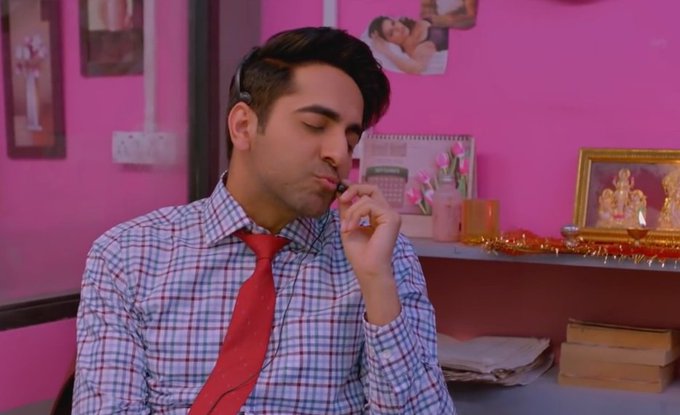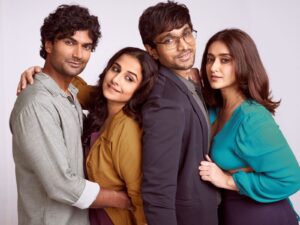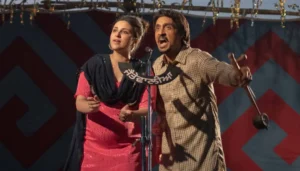
Okay, so the leading man in Dream Girl has an unusual vocation. Essayed by Ayushmann Khurrana, his real name is Karam – something that is barely registered until the film’s third act. The young man is better identified as Pooja – by us and by his numerous dial-in lovers. In director Raaj Shaandilyaa’s Dream Girl, Ayushmann Khurrana plays a listener that we never had. Someone to console us over a series of post-breakup stories. Someone to appreciate our lame couplets born out of sheer domestic and professional monotony. Or maybe someone to simply listen to you – whatever we’ve got to talk. The angle where Dream Girl makes it all spicy is in the enticing manner that it projects Pooja – she is as sweet, approachable but is also inviting and coquettish.
A cop, a brash teenager, a man-hating female executive and a celibate simpleton – all of them stand lured by Pooja’s angelic voice. One that Karam takes up out of desperation (thanks to severe unemployment), the call-centre job becomes a double-edged sword for him. Much like full-time vocation as a sperm donor in Vicky Donor, it is this unusual (and borderline embarrassing) job that has brought him affluence and also, indirectly, a girlfriend. Whilst he is engaged to marry the beautiful Mahi (Nushrat Bharucha), things hit the rock-bottom when Karam realizes how a man called Rahul that Pooja flirts with is actually his widower father (Annu Kapoor). As much as he wants to escape this never-ending maze, there is also his deadly employer who threatens to ‘expose’ him if he intends to quit. Whether Karam manages to escape their clutches is what Dream Girl attempts to pack in with loads of humour.
In the first act, Shaandilyaa wastes no time to set up the protagonist’s unique ability (of being in touch with his feminine side) and his immediate predicament (unemployment). The first two acts eject almost every ounce of humour that the trailer and the brief dialogue promos had to offer – making us feel a little disappointed with the scheme of things. There also remains the mystery on how the writers will disentangle this chaos, especially as the father’s character enters the web of Karam’s miseries.
One that kicks off like one of those ‘90s Hindi sitcoms, the proceedings get outrageously funny but also a tad bit slow in the second hour. The entire episode of the father meeting his ladylove at a ghazal-themed restaurant is uproarious, despite its conventional staging. The passage that follows wherein Karam along with his bestie convinces him to think beyond his reservations might go against certain immediate character motivations. Then again, the writers package the resultant bits with so much spice that the suspense stands elevated with each passing reel.
The humour quotient improves further when Pooja’s lovers come loggerheads with each other, giving Karam more than one reason to flee. The least interesting leg, even here, is that of the fiancée – who sometimes drops in with a random soup or otherwise appears to herald the progressive, independent woman flag. Bharucha’s Mahi just doesn’t work even though the actor is pretty earnest towards what she is entrusted with.
As Dream Girl, reaches its predictable finale, Khurrana has already made his mandatory speech to dismantle the taboo around yet another of his onscreen occupation. They attribute Pooja’s increasing popularity to the mounting loneliness in urban and semi-urban India in days of digital revolution. As much as I would want to buy this, even in the jest of humour, none of her admirers would have bought into her charms if she weren’t a woman – let alone a saucy tone that she approaches callers with. It is certainly not the same as easy as Khurrana’s Vicky and his doctor delivering discourses on how the character’s profession gave hope and light to many lives.
That reminds me of how Shaandilyaa purposefully avoids a strong emotional foundation in Dream Girl. Even though this arc is not exactly a mandate in a film of this ilk, it is bizarre when Dream Girl gets serious in a couple of instances. Case in point being a brief scene where Karam and Smiley reminisce the sacrifices made by the former’s father in the absence of his wife. Likewise, Rajesh Sharma’s WJI is too plastic an antagonist for a film as quirky as Dream Girl. As much fun I had in the climax, the closure to his track seemed too clichéd, even by commercial cinema standards.
One that captures the regional flavour to a T, the colours and the landscape canvassed in Dream Girl easily amplify the state tourism efforts. The DOP (Aseem Mishra) maintains a neat balance between the film’s rustic as well as colourful frames. Production design (Raj Poddar) is equally tasteful – be it the interiors of Karam’s home, the police station or the seedy call centre. Meet Bros get the signature song (‘Dil Ka Telephone’) just right whereas the rest of the tracks turn out to hinder the flow of the narrative. Dialogues – one of the mainstays in Dream Girl – are terrific for most parts and this is one area where Shaandilyaa literally shows off his know-how of the region’s diversity. To cite an instance, without offering spoilers, there is a Muslim cleric who exclaims about Pooja’s skills, “Yeh kaisi aurat hai? Jo har variety ka aadmi phansa rakhi hai. Aur ek hum hi reh gaye,” Call it the timing or the overall hilarity of the sequence, I don’t remember the last time I laughed so much watching a Hindi film that is fully aware of its nonsensical skin.
Performances are expectedly refined with Khurrana turning in his naughtiest performance yet. While the attempt might not be as technically faultless as Kamal Haasan in Avvai Shanmughi / Chachi 420, the actor gently makes a statement that there’s no one quite like him in Hindi cinema as of today – at least in the age group that he is in. Annu Kapoor is a livewire as Jagjeet Singh. In a character that starts off being a bit of a bore, Kapoor eventually becomes the film’s funniest element as the graph of his part touches finer nuances. Vijay Raaz lets his hair down and proves it yet again that he understands the grammar of the commercial comedy genre like no other. Abhishek Banerjee and his full-toothed smile works yet again as his bhramachari turned prem pujari act hits all the right notes. Raj Bhansali packs a pleasant surprise as the desi Justin Bieber whereas Nidhi Bisht is quite a dynamite as Roma (perfectly named, isn’t it?). Manjot Singh as Khurrana’s adorable aide holds his own without coming off as a mere sidekick.
As the film concludes, all I could think of was what the film had to offer as compared to Ayushmann Khurraana’s erstwhile slice-of-life dramas. Well, the story pattern is nearly the same as Vicky Donor sans the family and emotional upheaval bits. The risqué factor is on the lower side as compared to the aforementioned film, Shubh Mangal Saavdhan and Badhaai Ho. Then again, the humour is more inclined towards the ‘comedy of errors’ territory as opposed to something that spontaneously originates from the peculiar situation that the lead character is in. The setup is a glossier version of what was in Dum Laga Ke Haisha and Khurrana’s Karam could match Bareilly Ki Barfi’s Chirag when it comes to being haughty.
All the similarities aside, I do not think Khurrana himself has had as much fun on screen till date playing royally to the gallery. The energy of Dream Girl is infectious and so does the intrigue around the fresh plot that it tiptoes around.
That said, the next challenge for Khurrana and his filmmakers will be to drift away from the formula. For a fact, these films have begun treating him as a puppet that puts in a fun show, as if on autopilot. It is just that a dozen films and a National Film Award later, stocks have suddenly risen for Khurrana and this is something that all parties concerned ought to ponder seriously into.
Rating: ★★★

